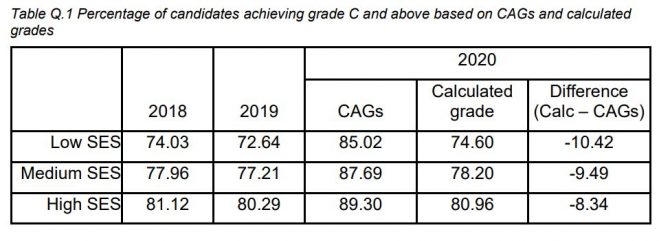Poorer pupils are more likely to have had their centre-assessed A-level grades lowered during the standardisation process, Ofqual has admitted.
Analysis by the exams regulator shows the grades of pupils from low socio-economic backgrounds fell by a larger margin than their better-off peers after moderation.
But Ofqual claimed it had found “no evidence” that the system for awarding grades this year was biased against certain pupils.
This year, schools issued centre-assessment grades for pupils in place of formal exams. The grades were then standardised by exam boards, with calculated grades issued to pupils today.
But an outcry across England about the nearly 40 per cent of grades downgraded has led to strong criticism of the moderation process, and calls for a review.
According to Ofqual’s interim report on the A-level grading system this year, the proportion of the poorest pupils achieving a grade C or above fell by 10.42 percentage points during moderation, compared with 9.49 percentage points among pupils from a medium socio-economic background, and 8.34 percentage points among the best-off pupils.
Ofqual said its research had found teachers “have a tendency to over-estimate to a greater extent the grades of socio-economically disadvantaged students”, which meant the grades of disadvantaged pupils were more likely to go down.

Ofqual said it was “difficult to draw firm conclusions” from the analysis, as different centres varied in terms of the “generosity of the CAGs submitted”.
“The outcomes in all three years are higher for students with high socioeconomic status (SES) and therefore there is less scope for overgenerous CAGs than for students with lower SES who, in general, tend to have lower outcomes overall”.
The report states that “assuming that centre level demographics are stable over time” the standardistaion approach “should not exacerbate attainment gaps between students with different protected characteristics or from different socio-economic backgrounds.”
It concludes that there is “no evidence that the process of awarding grades has been biased for or against students from different socio-economic backgrounds”.
The findings come after the standardisation process used in Scotland was found to have disproportionately affected disadvantaged pupils.
Earlier this week, the Scottish government withdrew all grades that had been downgraded amid mounting political pressure. Gavin Williamson, the English education secretary, has said he will not follow suit.
Ofqual’s analysis also found regional variations. In the East Midlands the percentage of pupils earning a grade A and above jumped by 3.4 percentage points, but in the north west it only rose by 1.8 percentage points.
The overall percentage of pupils attaining grade A and above still remained higher in the north west at 25.3 per cent.
Pupils in the south east were the most likely to receive a grade A or above, with 30.7 per cent of pupils in the region doing so, followed by pupils London and south west where 29.8 and 28.6 per cent of pupils respectively got top grades.
Ofqual previously confirmed students will not be able to appeal themselves, but they will be able to ask their schools to appeal on their behalf.
If pupils suspect bias or discrimination, they have been told to first speak to their school and raise a complaint through its complaints policy. If they feel their concerns are not addressed by their school, students can then consider raising concerns with exam boards.
Update: At around 6pm on Thursday August 13, Ofqual published additional data that was not previously included in its report. The data shows that although there was a greater reduction in the proportion of poorer pupils receiving B to E grades, that group actually saw a smaller reduction in A* and A* to A grade results as a result of standardisation than better-off groups.








This method of assessment will prevent any top scoring student that attends one of the “low SES schools” from ever following a career as a doctor, dentist, barrister, vet etc as they need the very best grades to be offered a place. During my 40+ years working at a university I have seen thousands of students from poor backgrounds achieving top the grade in their degree, and going on to higher qualifications and top jobs.
This blanket method of reassessing grades is blatantly unfair.